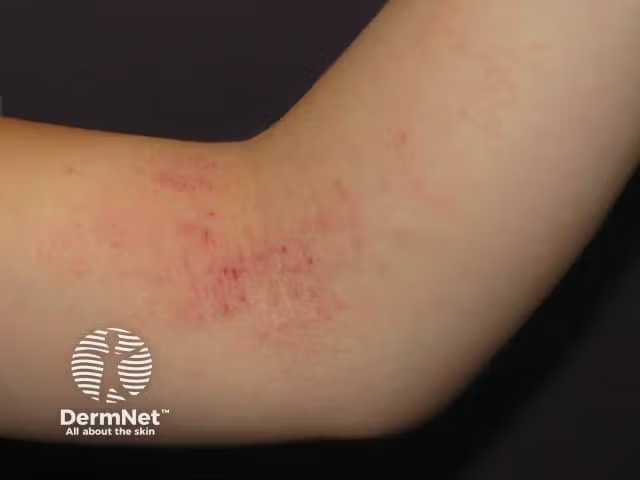- Case-Based Roundtable
- General Dermatology
- Eczema
- Chronic Hand Eczema
- Alopecia
- Aesthetics
- Vitiligo
- COVID-19
- Actinic Keratosis
- Precision Medicine and Biologics
- Rare Disease
- Wound Care
- Rosacea
- Psoriasis
- Psoriatic Arthritis
- Atopic Dermatitis
- Melasma
- NP and PA
- Skin Cancer
- Hidradenitis Suppurativa
- Drug Watch
- Pigmentary Disorders
- Acne
- Pediatric Dermatology
- Practice Management
- Prurigo Nodularis
- Buy-and-Bill
Video
The Burden of Atopic Dermatitis
Andrew F. Alexis, MD, MPH, and Benjamin N. Lockshin, MD, review the burden of atopic dermatitis and discuss how they talk to patients about the impact their disease has on their lives.
Andrew F. Alexis, MD, MPH: Hello, and welcome to Between the Lines, a journal club experience. Today’s featured article is “Dupilumab Provides Acceptable Safety and Sustained Efficacy for Up to 4 Years in an Open-Label Study of Adults with Moderate-to-Severe Atopic Dermatitis.” My name is Andrew Alexis. I’m the vice chair for diversity and inclusion and professor of clinical dermatology at Weill Cornell Medical College in New York, New York. It’s my pleasure to be joined by my good colleague and friend, Dr Benjamin Lockshin, a practicing dermatologist and director of the Clinical Trials Center at DermAssociates in Silver Spring and Rockville, Maryland. Dr Lockshin, would you like to say a quick hello?
Benjamin N. Lockshin, MD: It’s a pleasure to be here with you discussing this excellent article. I think we’ll have a really nice conversation about some of the details in this long-term extension article with dupilumab.
Andrew F. Alexis, MD, MPH: Great. In today’s discussion, we will review the practical and clinical implications of the open-label extension study, as well as discuss the impact of dupilumab in clinical practice today. I look forward to a robust discussion about that. Before we get into the data, why don’t we just talk a little bit about atopic dermatitis, especially the [effect] of AD [atopic dermatitis] on patients’ quality of life. Ben, can you comment on…how it manifests as far as quality-of-life impact for your patients?
Benjamin N. Lockshin, MD: I think many of us who deal with inflammatory conditions such as psoriasis and atopic dermatitis know that the impact on this disease process extends far past what we see visually. It’s well established that atopic dermatitis’ impact in terms of quality of life encompasses anxiety, depression, sleep disorders. In fact, the impact of this is comparable to what we see with psoriasis and many other inflammatory conditions. In addition, many of these individuals have either effects that spill over into school or work. We see increased rates of absenteeism; we have decreased productivity. Really understanding how this affects individuals holistically is very important in terms of understanding how to [treat] these patients. What do you ask patients?
Andrew F. Alexis, MD, MPH: I think that your summary was really spot on and very well said in that it’s key that we look beyond just the dermatologic manifestations on our patients and really consider what is the impact of this inflammatory condition, atopic dermatitis, on their day-to-day lives, whether it’s school or work, social interactions. To answer your question, what do I ask patients? I like to start with an open-ended question just to find out how they are doing overall. That sounds like such a simple question, but keeping it so open-ended, you tend to elicit a few clues as to how things are going with work and school and social interactions. Then, from there, I can ask subsequent questions and figure out how the skin conditions impact those. How about you?
Benjamin N. Lockshin, MD: I love your approach. Honestly, I do a very similar thing. I ask, “What bothers you the most about your atopic dermatitis?” And I just pause; I give them the opportunity to bring up the components that mean a lot to them. It’s surprising how variable some of the responses are but they all [are] in the same groupings. The visual effects, the effects on itch in terms of sleep disruption, the stigma around it. Many patients not only talk about the effects of their AD, but really the burden of some of their treatments as well. Probably just like you, many of my patients have seen a number of other physicians prior to seeing me and often times are very dissatisfied with smearing a cream over the body or the amount of time it takes throughout the day to just maintain moderate control of their disease.
Andrew F. Alexis, MD, MPH: Well said. Those patients who are not so forthcoming with an open-ended question will then get very specific about asking about specific demands, such as sleep and school, if applicable, work, their relationships or how easily or how much difficulty they might have with going through their treatment regimen.
TRANSCRIPT EDITED FOR CLARITY






